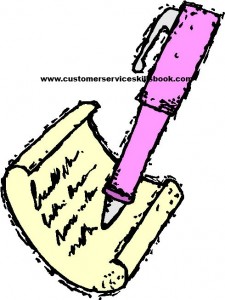Effectively Taking Telephone Messages
Have you ever called a business only to have the person on the other end of the phone stumble through information gathering when trying to take a message for someone else? If so, you are not alone. It often seems that companies are not investing in basic customer service skills training anymore. After all, how hard is it to ask someone for their name and other pertinent information, write that down and give the message to the appropriate person. Apparently very hard for many customer service representatives and employees in many organizations.
If you ever find yourself in the situation where you are on the receiving end of a customer’s call and need to capture information professionally, the following is a “cheat sheet” of essential things you should get and record. At a minimum, when you take a message you should get this information from a caller when you answer a phone for someone else. This will aid you in providing the best customer service possible
- Name (correctly spelled—ask the caller for spelling and do not assume you know how they spell it. For example, my last name is spelled LUCAS. There is a nursery in town spelled LUKAS).
- The caller’s company name.
- Phone number (with area code and country code, if appropriate).
- Brief message (why they are calling and what they expect to happen next).
- When the call should be returned.
- Time and date of the call and your name (in case a question about the message arises).
Many office supply stores sell pre-printed phone message pads to help guide message takers.
About Robert C. Lucas
Bob Lucas has been a trainer, presenter, customer service expert, and adult educator for over four decades. He has written hundreds of articles on training, writing, self-publishing, and workplace learning skills and issues. He is also an award-winning author who has written thirty-seven books on topics such as, writing, relationships, customer service, brain-based learning, and creative training strategies, interpersonal communication, diversity, and supervisory skills. Additionally, he has contributed articles, chapters, and activities to eighteen compilation books. Bob retired from the U.S. Marine Corps in 1991 after twenty-two years of active and reserve service.
Make Money Writing Books: Proven Profit Making Strategies for Authors by Robert W. Lucas at Amazon.com.
The key to successfully making money as an author and/or self-publisher is to brand yourself and your company and to make yourself and your book(s) a household name. Part of this is face-to-face interaction with people at trade shows, library events, book readings, book store signings, blogging or guest blogging on a topic related to their book(s). Another strategy involves writing articles and other materials that show up online and are found when people search for a given topic related to a topic about which the author has written.
If you need help building an author platform, branding yourself and your book(s) or generating recognition for what you do, Make Money Writing Books will help. Bob’s popular book addresses a multitude of ideas and strategies that you can use to help sell more books and create residual and passive income streams. The tips outlined in the book are focused to help authors but apply to virtually any professional trying to increase personal and product recognition and visibility.

